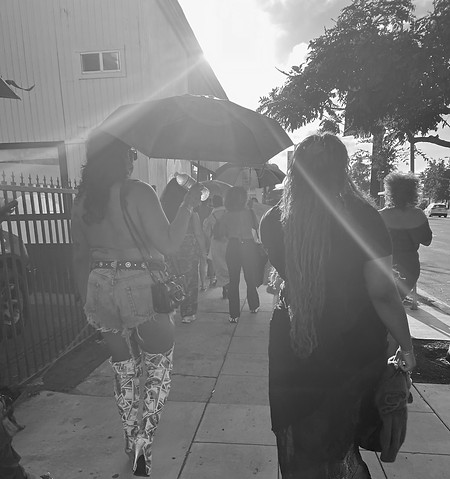


La Vida de la Puta es Bella

Lisseth Sanchez. Tribute print by @Effemy Xitllali
a storytelling project by & for sex workers impacted by HIV
SPRING 2025

La Vida de la Puta es Bella celebrates the lives & stories of sex workers impacted by HIV
La Vida de la Puta es Bella is a storytelling film project exploring the intersection of HIV and sex work, created and led by current and former sex workers impacted by HIV, many of us living with HIV. Through this project we aim to promote understanding, challenge harmful stereotypes, and advocate for decriminalization. We recognize and celebrate the experiences of senior sex workers, ensuring these stories and wisdom are integral to our narrative. Our work is grounded in the belief that every sex worker deserves safety, respect, and the right to live without fear of violence or criminalization. By sharing stories of strength and community, we seek to dismantle the stigma surrounding HIV and create a future where sex workers, including seniors, can thrive.
La Vida de la Puta es Bella es un proyecto cinematográfico narrativo que explora la intersección del VIH y el trabajo sexual, creado y dirigido por trabajadores sexuales actuales y anteriores afectados por el VIH, muchos de los cuales viven con el VIH. Estamos tratando de promover comprensión, cuestionar perjudiciales estereotipos y abogar por la decriminalización mientras nos enfocamos en las voces de los trabajadores sexuales. Reconocemos y celebramos las experiencias de los adultos mayores que son trabajadores sexuales asegurando que sus historias y sabiduría sean parte integral de nuestra narración. Nuestro trabajo se basa en la creencia de que cada trabajador sexual merece seguridad, respeto y el derecho a vivir sin temor a la violencia o la criminalización. Al compartir historias de fortaleza y comunidad estamos tratando de desmantelar el estigma que rodea al VIH
La Puta Team
Many people are involved in the making of this project. From those sharing stories, generously providing supplies, skills or materials, to those providing advice or advocating for us behind the scenes. Below is the core production team responsible for making this project happen.
Muchas personas están involucradas en la realización de este proyecto. Desde quienes comparten historias, brindan generosamente suministros, habilidades o materiales, hasta quienes brindan consejos y quienes nos defienden detrás de escena. A continuación se muestra el equipo de producción principal responsable de hacer realidad este proyecto

Lisseth Sanchez
Founder (in loving memory)

Luisa Rivera
Production Advisor

Ashley Madness
Production Advisor

Laila X
Advisory Board

Lotus Lain
Creative Director

Cesar Espinoza-Perez
Production Advisor

Johana Ramirez
Advisory Board

Janesta Edmonds
Videography | Photography

Janelle Luster
Content Director

TS Jane
LVPB Crew

Bambi Rising
Editor & Film Advisor

Úmi Vera
Interpretation

Cocoa Makati
Executive Producer

Michaé de la Cuadra
LVPB Crew

Antone X
Videography

Lourdes Sherman
Translation
SUPPORT
LAS PUTAS
Help us continue our project collecting and celebrating wisdom of our community by making a tax deductible donation to La Vida de la Puta es Bella.
Ayúdanos a continuar nuestro proyecto recolectando y celebrando la sabiduría de nuestra comunidad haciendo una donación deducible de impuestos a La Vida de la Puta es Bella.
PROJECT FAQ
01
What is La Vida de la Puta es Bella?
This transformative arts-based project aims to address HIV stigma within the sex worker community by capturing the experiences of sex workers, particularly elders, affected by HIV. This innovative initiative combines a storytelling film series and community engagement to promote understanding, resilience, and holistic well-being.
02
How did this project come to be?
This project was inspired by the lives and recent passing of our beloved Lisseth Sanchez and Carol Leigh. Lisseth led a Mujeres translatina support group for 7 years. She was outspoken about sex worker rights, migrant rights, gender equality and HIV justice. As a street based worker she helped others understand the perspectives of street based workers, immigrant/ undocumented people, seniors, or people living w/ HIV. She always pushed for more arts opportunities to draw attention to the challenges and resilience of aging sex workers affected by HIV, and for the creation of space for the most marginalized sex workers to share their stories. Her life and presence demonstrated the power of storytelling to catalyze change; be that in the realm of policy, public perception, or hearts and minds. Following her passing we created a mutual aid fund in her honor, specifically for trans Latina sex workers, La Vida de la Puta es Bella - one of Lisseth’s many sayings. It launched as a branch of Scarlot’s Roses, DecrimSexWorkCA’s mutual aid program. After our first cycle, an analysis of application data showed a clear association between HIV and other health determinants and the dire need for more support in our communities. For example, out of our verified applications for sex workers living with HIV: 90% are doing street based sex work; 50% are also living with a disability; close to 40% are unhoused or unstably housed; and another 40% are im/migrants or undocumented. These numbers do not reflect the sex workers who are not living with HIV yet face significant barriers to housing, employment, other culturally sensitive or gender affirming care, including HIV services. Given the current political climate and the heightened vulnerability and isolation in our community, it is imperative more than ever to raise awareness and resources that support holistic health among sex workers affected by the HIV epidemic.
03
How is this project funded?
Funding provided by the Health Resources & Services Administration (HRSA) Ending the HIV Epidemic Grant and the County of Los Angeles, Department of Public Health, Division of HIV and STD Programs Particionado por la Administración de Recursos y Servicios de Salud (HRSA), Poner Fin a la Epidemia del VIH y el Condado de Los Ángeles, Departamento de Salud Pública, División de Programas Contra el VIH y ETS
04
Where do the proceeds go?
There are no proceeds from this project. If we do receive any donations as a result of this project, they will go towards the continuation of La Vida de la Puta as Bella or Scarlot's Roses, our mutual aid program.
05
What qualifies you to do this?
As a group of sex workers impacted by HIV in a variety of ways, we are best positioned to share our own experiences and stories. When it comes to the technical aspects of the project we are grateful to have the support from allies and partners who throw support behind those most directly impacted. Historically sex workers have been relegated to the sidelines of the HIV movement despite being disproportionately impacted by it. DSWCA is an organization led by sex workers & supported by member organizations working in related areas, so we are a non-traditional partner in that sex worker led organizations are not traditionally included in formal spaces around HIV work, and in that we are a non-traditional organization working in the HIV movement. Our roots are in sex worker rights advocacy centering around passing SB 233,6legislation that excluded condoms from being used as evidence that someone committed a consensual sex work-related criminal offense. While our membership and leadership and work have always included people living with HIV and people working in related fields, sex worker political and mutual aid organizations are not traditionally included in or funded by the mainstream HIV movement.
06
How do I get involved?
Want to find out more about telling your story or volunteering in the making of our film project? There is lots of work to go around and we encourage sex workers, especially those impacted by HIV to get in touch and get involved!
07
How is LVPB different then other HIV interventions?
HIV interventions in the sex worker community often focus on prevention and clinical interventions but fall short in addressing the underlying causes of HIV disparities. Moreover, interventions often lack meaningful opportunities for leadership development and creation. Our intervention provides a unique space and the resources for sex workers affected by HIV to meaningfully co-create. Through a leadership and implementation structure that involves sex workers from inception to completion and prioritizes those living with or affected by HIV, our intervention’s impact is as much about our final film product, as it is about the process we use to co-create it. It is well known that discrimination and criminalization contribute to sex workers being disproportionately affected by HIV. Disparities associated with HIV such as gender, unstable housing, coexisting mental health or substance use disorders, or other social determinants of health are compounded for sex workers, particularly those of gender and racial minorities or who are undocumented. This film series brings to light the nuances of HIV disparities faced by different sex worker subpopulations while drawing out community strategies that have been effective when traditional care models fall short. By listening to those most affected, we will gain new perspectives on ways to address internal and external stigma.
08
How does this project help end the HIV epidemic?
This project contributes to ending the epidemic by using an arts-based approach to combat stigma against sex workers and people living with HIV. We do this by humanizing, affirming and celebrating the lived experiences of the sex worker community in the context of HIV. These mini films honor and showcase our collective struggles, methods of survival, and means of resistance. Each film is an intimate portrait of a community member, while the project as a whole emphasizes the significance of a public health, harm reduction and a human rights based approach to sex work and HIV. Decades of evidence-based research on HIV and sex work has shown that stigma and criminalization undermines HIV prevention, testing, treatment, and care. Stigma reinforces discrimination and isolation which negatively affects quality of life and other health and social outcomes. The World Health Organization2, UNAIDS3, and world renowned medical journals like The Lancet4 have been explicit in the ways that stigma, discrimination, and criminalization undermine HIV, STI and BBV prevention efforts among sex workers. Despite such evidence, there are still enormous barriers to HIV services and social support, stable housing, or services to support substance disorders and mental health. Taking a holistic whole-person approach to prevention and care among sex workers, especially those living with HIV, and examining the role of structures and systems upholding barriers must be at the center of the HIV response. Our intervention builds on the rich, but often forgotten, history of HIV activism and mutual aid among sex workers, and explores what the future holds for aging sex workers affected by HIV.
""
"We owe a lot to HIV organizers who came before us, to HIV positive sex workers and LGBTQ activists, to HIV providers and allies activated by fighting against HIV/AIDS, and we owe it to ourselves and each other to take care of our community members impacted by--or seeking to avoid being impacted by--HIV."
""
"Many of us acquire HIV not through sex work, but through some love relationship. Because with clients we always take care of ourselves, we always maintain that work role between client and sex worker and we do not take care of ourselves when we have a sexual partner, when he is our partner, our husband, as we call him."
""
"Es importante por su contenido ya que esta hecho de trabajadores sexuales para trabajadores sexuales reflejaremos nuestro trabajo de pares y visibilizar nuestro poder colectivo desde nuestra organización. Espero atraer la mirada de los que desconocen nuestro negocio o trabajo."
""
"It is the first time that I am talking openly about my diagnosis and I do it because it is necessary for people to realize that stigma and discrimination have been partly a reason for many people to die."
